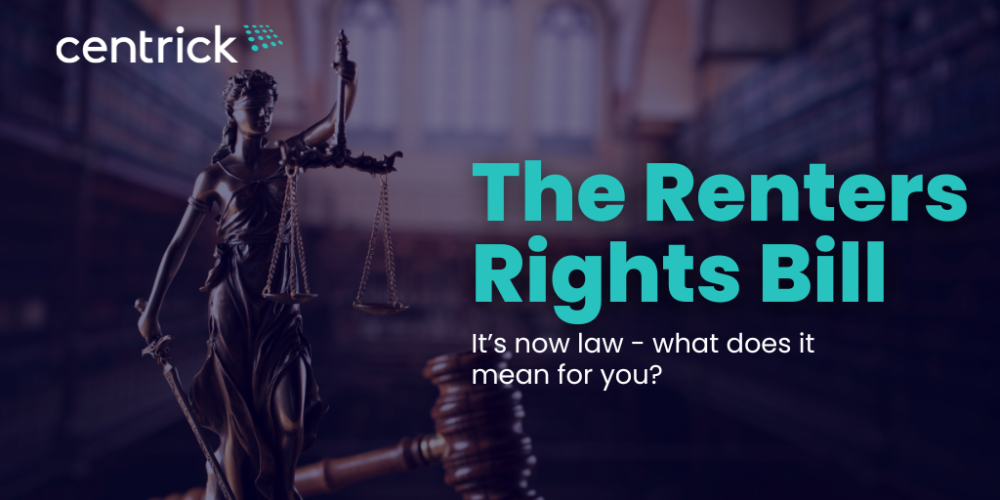What Does The Most Seismic Shift in Renting in 30 Years Mean to You?
On 27th October 2025, His Majesty the King granted Royal Assent to the Renters Rights Bill, meaning the Renters Rights Act 2025 has now officially become law. First introduced to Parliament on 11th September 2024, the Renters Rights Bill represents the most significant reform to the rental sector in over 30 years.
While the Bill has passed, none of its main provisions are yet in force. It sets the framework for a new rental system, but further regulations are needed before the changes take full effect. The exact timeline remains unclear, although the Government has made clear its intention to implement the reforms as soon as possible.
The Bill’s aim is to create a fairer, more transparent rental system for the UK’s 11 million renters. Any move that will force ‘rogue’ operators out of the sector should ultimately be a welcome one – not just to tenants, but to all professional and institutional landlords, presenting a clear opportunity for reputable operators to invest in sustainable, long-term housing models that offer the quality and service residents should expect.
But there’s no denying that this is a seismic change for the sector and how we all operate.
The challenge for professional landlords and operators now comes in the implementation. The political drive to rush through this legislation before courts or local authorities have the resources and ability to play their part in this change means the burden of implementation rests with us in the private sector
So, what does this landmark change mean for landlords, operators, and tenants?
Key Changes and What They Mean
A. Abolition of Section 21 ‘No Fault’ Evictions
Landlords can no longer evict tenants without a valid reason, shifting the balance toward tenant security.
- Changes for tenants: Greater security and stability – tenants can’t be evicted without cause.
- Changes for landlords: Reduced flexibility in regaining possession, longer exposure to non-paying or problematic tenants, and potential delays due to court backlogs. Landlords will need to have a clear, long term strategy to benefit from their rental investments, but professional landlords may be able to capitalise on more investment opportunities as ‘accidental’ landlords look to exit the market.
B. Increase in Minimum Arrears Threshold Before Eviction
Tenants now have more time to address short-term financial difficulties before landlords can seek possession.
- Change for tenants: More time to resolve arrears without facing immediate eviction.
- Change for landlords: Extended waiting periods increase cash flow risks, as landlords may wait up to four months before court action is possible. Professional referencing of tenants before accepting a new tenancy has never been more important.
C. Abolishing Fixed-Term Tenancies
Tenancies will become rolling periodic agreements rather than fixed-term contracts.
- Change for tenants: Greater flexibility to move without being tied to long-term contracts.
- Change for landlords: While there will undoubtedly be some initial uncertainty over tenancy length and how to model rental income to raise finance until likely trends across regions and asset classes can be more accurately predicted, in Scotland where similar legislation has been in place for a while, landlords report typically longer term tenancies as a result of tenants feeling more ‘settled’ in their home.
D. Section 13 – Fairer Rent Increases
Rent increases will now be subject to oversight to ensure fairness.
- Change for tenants: Increased protection against sudden or excessive rent hikes via tribunal review.
- Change for landlords: Requirement to document rationale for rental increase (eg. local market comparables) to justify rent levels and potential disputes delaying income adjustments.
E. Minimum Property Standards (Awaab’s Law & Decent Homes Standard)
Landlords must maintain properties to strict safety and habitability standards.
- Change for tenants: Tenants can feel more assured they will have healthier, safer homes free from damp, mould, or hazards.
- Change for landlords: in practice, limited change for reputable landlords who already look after their tenants and properties, other than they will need to ensure they are documenting and can easily prove their repair process is within required timeframes. For poorer performing or ‘rouge’ landlords this is a watershed moment – step up, or ship out!
F. Requirement for Digital Property Management
All tenancy and maintenance records must be stored and tracked digitally.
- Change for tenants: Easier access to tenancy information and transparency in maintenance.
- Change for landlords: For landlords already using a professional, accredited operator there will be no change. Reputable, accredited 3rd party operators should already be using all digital property management platforms required. For those who are managing privately or with smaller operators, there may be an initial costly set-up requirement, but it’s an investment that should see operating efficiencies in time.
G. Private Rented Sector Ombudsman & National Landlord Registry
Landlords must register and participate in dispute resolution schemes.
- Change for tenants: Access for all tenants to impartial dispute resolution and a transparent record of landlords.
- Change for landlords: Increased scrutiny, mandatory registration, and potential reputational exposure if disputes arise.
H. No Upfront Rental Payments
Landlords can no longer demand rent before the tenancy start date.
- Change for tenants: Lower upfront costs and easier access to housing.
- Change for landlords: Immediate financial exposure if tenants default from day one.
I. No More Advance Rent (e.g., 6 Months Upfront)
Landlords cannot request multiple months’ rent in advance.
- Change for tenants: Fairer treatment for tenants without large cash reserves.
- Change for landlords: Loss of a common risk-mitigation tool; however, there are insurance-backed solutions where guarantors are not available that can mitigate risk.
J. Pets to Be Allowed Where Reasonable
Tenants can keep pets unless there is a legitimate reason to refuse.
- Change for tenants: Greater freedom to own pets.
- Change for landlords: Landlords can no longer arbitrarily refuse pets and will need to allow for this in end of tenancy dilapidation assessments. However, it’s expected a certain amount of pragmatism can come into play, for example allowing multiple large animals into small premise, or where the Headlease precludes pets the decision is out of the landlord’s hands etc.
K. Guarantors No Longer Liable After Tenant Death
Guarantors are not responsible for rent if a tenant dies.
- Change for tenants: Compassionate and fair treatment in tragic circumstances.
- Change for landlords: Landlords may face a shortfall in rent previously covered by guarantors, however, most decent landlords rarely chase a guarantor following the death of a tenant anyway.
As with the introduction of all new legislation, it usually takes some time for a market to start to feel the impact of the changes. While the private sector will, as always, lead the way in the practical and operational changes required to make the measures contained within the Renters Rights Act 2025 a reality, the industry is widely ‘keeping its fingers crossed’ that the court systems and local authorities will be given the resource and working parameters required to support the rental sector.
If you are already a client of Centrick, you will have received specific communications via email with details about how Centrick will support you through these changes. If you’re not a client and would like to enquire about how Centrick could support you, please complete the contact form below.









